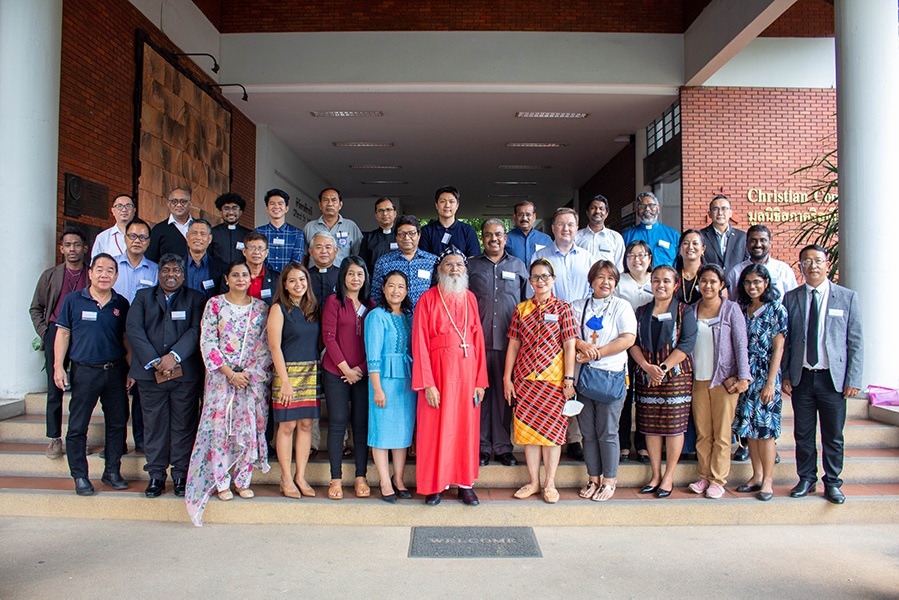WCC及CCA於2022年10月24~26日在泰國清邁西北大學(亦即CCA總部)聯合舉辦亞洲區國際研討會,主題為「普世服務:為實現永續發展目標的靈性奮鬥(Ecumenical Diakonia, A Spiritual Struggle to Attain Sustainable Development Goals)」。客家宣教中會龍潭長老教會黃馨蓮牧師受派代表台灣基督長老教會普世關係委員會出席亞洲區國際研討會。原住民宣教委員會幹事Rii Taljimaraw(日依・達里瑪勞)牧師也一同前往參加。 
Chiang Mai: Asia Regional Consultation on ‘Ecumenical Diakonia, Church’s Response to Sustainable Development Goals (SDGs) in Asia’–2022 Participants Chiang Mai: The Asia Regional Consultation on ‘Ecumenical Diakonia, Church’s Response to Sustainable Development Goals (SDGs) in Asia’ organised by the Christian Conference of Asia (CCA), in collaboration with the World Council of Churches (WCC), began on 24 October 2022 at the CCA headquarters in Chiang Mai, Thailand. Thirty-five participants representing CCA and WCC member churches as well as ecumenical diaconal organisations from across Asia are attending the three-day consultation. In a thematic address delivered at the opening session, CCA General Secretary Dr Mathews George Chunakara observed that Diakonia was an integral part of the mission of the church. It aims at the transformation of lives and working towards resolving the problem of increasing social and economic inequalities. The CCA General Secretary pointed out that the focus of the development goals by and large has been anchored now on the principles of the United Nations SDGs, but that in reality, the message of the SDGs has not reached the grassroots in Asia, including faith communities. He added that every church or congregation is involved in Diakonia as their prime mission in day-to-day witness, but these churches have not yet given adequate attention in responding to the SDGs due to lack of understanding on SDGs. It is in this context that the relevance of the global ecumenical conversation on ecumenical Diakonia, initiated by the WCC, becomes relevant as it is aimed at helping, sensitising, and motivating the churches as well as building their capacity. Recalling the historical development of discussions related to developing new paradigms for interpreting and articulating the vision of Diakonia, especially authentic ecumenical Diakonia initiated by the WCC over the decades from time to time, Dr Mathews George Chunakara commented that the contributions of WCC, not only in articulating its vision of ecumenical Diakonia but also its practical application, has been considered unique and it has been valued by churches across the world, especially in the global South. However, in recent years WCC lost its original mandates of direct involvement in the practical application of ecumenical Diakonia through member churches; as such, most churches in developing countries have been now outside of the newly created ecumenical Diaconal platforms or structures. Dr Mathews George Chunakara added that the core principle of the SDGs is that ‘no one is left behind’, and this is in line with the cardinal principle of embracing all God’s people and working for their welfare. The CCA General Secretary underscored the possibilities for linkages between the SDGs and the mission of the churches through their Diaconal mission, especially in strengthening ecumenical Diakonia, and in deciding the extent to which the Church and the ecumenical movement should be involved in achieving the sustainable development goals together with other actors beyond churches. In a session on ‘Called to Transformation: Ecumenical Diakonia’, Rev. Matthew Ross, Programme Executive for Diakonia of the WCC, outlined the theological and practical service for Diakonia through a document adopted by the WCC, which was brought out as a publication during the 11th Assembly in Karlsruhe, Germany. He introduced the significance of the study document on Ecumenical Diakonia, which focuses on prophetic Diakonia and addresses peacebuilding, climate justice, gender justice, racial justice, and health and healing. “Diakonia is church-related social care—an essential component of the service that we are called to do as Christians. Faith is our response to God’s grace, and we are called to live out God’s grace and love by loving our neighbor as ourselves. However, we cannot do it alone,” said Rev. Ross. While extending greetings at the opening session on behalf of the WCC, Rev. Matthew Ross outlined the new initiatives of working together with different regional ecumenical organisations across the world, especially in addressing emerging concerns in the area of sustainable development. SOURCE>CCA |